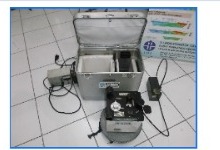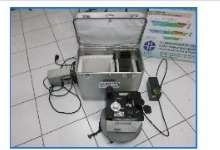Paid
SERVICE DESCRIPTION | Chemisorption analysis is an important technique for understanding the surface properties of materials, especially in heterogeneous catalysis. This service will use the instrument: CEMISORB 2750. There are 3 types of service for this instrument, namely…
- Laboratorium Karakterisasi Lanjut Kimia Maju II
- KST Serpong (Bacharuddin Jusuf Habibie)
Gedung 456 KST BJ Habibie, Tangerang Selatan, Banten 15314 - 08119811561
- labkarserpong@brin.go.id
Marketing Office
Deputi Bidang Infrastruktur Riset dan Inovasi BRIN
layanan_sains@brin.go.id
Chemisorption analysis is an important technique for understanding the surface properties of materials, especially in heterogeneous catalysis. This service will use the instrument: CEMISORB 2750. There are 3 types of service for this instrument, namely NH3-TPD (Temperature-Programmed Desorption), CO2-TPD, and H2-TPR (Temperature-Programmed Reduction).
Below is an explanation for each of the methods mentioned:
NH₃-TPD aims to measure the strength and number of acid sites on the surface of the material. In principle, ammonia gas (NH₃) is adsorbed on the catalyst surface at low temperatures, then released gradually with programmed heating. The desorbed NH₃ gas was detected using a TCD (Thermal Conductivity Detector) detector.
CO₂-TPD aims to measure the strength and number of base sites on the surface of a material. Carbon dioxide (CO₂) is adsorbed on the base surface at low temperature, then released by programmed heating. The desorbed CO₂ gas is analyzed with the same detection equipment as NH₃-TPD.
H₂-TPR aims to assess the reduction properties of materials, such as metal oxides in catalysts. The material was heated in a stream of hydrogen gas (H₂), and the H₂ consumption during reduction was recorded using a TCD detector..
Sample requirements:
1. The sample must be a solid powder.
2. The sample must withstand the desired measurement temperature (not experience decomposition/damage).
3. The sample does not have dangerous and corrosive properties that damage the equipment.
4. The minimum sample weight is 0.2 grams.
5. The client is required to include and explain the type and content of the material to be tested.
6. Clients MUST include the type of analysis desired in the description column (NH3-TPD or CO2-TPD or H2-TPR)
More Info:
https://wa.me/628119811561
Additional information:
- Samples that have been tested will be stored in the laboratory for a maximum of 1 months.
- Samples not taken within this time will be destroyed
Application Requirements:
Below is an explanation for each of the methods mentioned:
NH₃-TPD aims to measure the strength and number of acid sites on the surface of the material. In principle, ammonia gas (NH₃) is adsorbed on the catalyst surface at low temperatures, then released gradually with programmed heating. The desorbed NH₃ gas was detected using a TCD (Thermal Conductivity Detector) detector.
CO₂-TPD aims to measure the strength and number of base sites on the surface of a material. Carbon dioxide (CO₂) is adsorbed on the base surface at low temperature, then released by programmed heating. The desorbed CO₂ gas is analyzed with the same detection equipment as NH₃-TPD.
H₂-TPR aims to assess the reduction properties of materials, such as metal oxides in catalysts. The material was heated in a stream of hydrogen gas (H₂), and the H₂ consumption during reduction was recorded using a TCD detector..
Sample requirements:
1. The sample must be a solid powder.
2. The sample must withstand the desired measurement temperature (not experience decomposition/damage).
3. The sample does not have dangerous and corrosive properties that damage the equipment.
4. The minimum sample weight is 0.2 grams.
5. The client is required to include and explain the type and content of the material to be tested.
6. Clients MUST include the type of analysis desired in the description column (NH3-TPD or CO2-TPD or H2-TPR)
More Info:
https://wa.me/628119811561
Additional information:
- Samples that have been tested will be stored in the laboratory for a maximum of 1 months.
- Samples not taken within this time will be destroyed
Application Requirements:
- Photo
- Other Supporting File
| File Name | File Size | |
|---|---|---|
| Service SOP file | 0.44 MB | |
| Template Photo | 0 MB | |
| Template Other Supporting File | 0 MB |























